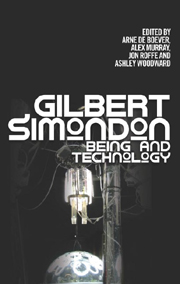Book contents
- Frontmatter
- Contents
- Abbreviations
- Editors' Introduction: Simondon, Finally
- 1 Technical Mentality
- Explications
- Implications
- Resonances
- 9 Gilles Deleuze, a Reader of Gilbert Simondon
- 10 Science and Ontology: From Merleau-Ponty's ‘Reduction’ to Simondon's ‘Transduction’
- 11 The Question of the Individual in Georges Canguilhem and Gilbert Simondon
- 12 The Theatre of Individuation: Phase-Shift and Resolution in Simondon and Heidegger
- Glossary: Fifty Key Terms in the Works of Gilbert Simondon
- Notes on Contributors
- Index
10 - Science and Ontology: From Merleau-Ponty's ‘Reduction’ to Simondon's ‘Transduction’
from Resonances
Published online by Cambridge University Press: 12 September 2012
- Frontmatter
- Contents
- Abbreviations
- Editors' Introduction: Simondon, Finally
- 1 Technical Mentality
- Explications
- Implications
- Resonances
- 9 Gilles Deleuze, a Reader of Gilbert Simondon
- 10 Science and Ontology: From Merleau-Ponty's ‘Reduction’ to Simondon's ‘Transduction’
- 11 The Question of the Individual in Georges Canguilhem and Gilbert Simondon
- 12 The Theatre of Individuation: Phase-Shift and Resolution in Simondon and Heidegger
- Glossary: Fifty Key Terms in the Works of Gilbert Simondon
- Notes on Contributors
- Index
Summary
If philosophy today must, as I believe it does, posit itself as ontology again, it cannot do so without engaging in a close confrontation with the natural sciences. Why? First of all, because many of the questions and issues that traditionally fell under the authority of philosophy, and which helped clarify the fundamental meaning of that which is, now fall under that of science. More importantly, though, and as a result of the evolution of science itself, because such questions and issues have been radically transformed in the hands of science, especially in the last hundred years. Does this mean that, henceforth, philosophy must become philosophy of science, and let its own problems and methods be determined by those of science? Not at all. In the light of the event of science, philosophy must avoid a twofold trap: that of philosophizing without taking into account the challenge of science for thought; and that of subordinating philosophical thought to scientific procedures and ‘facts’. In other words, it can be a question of neither blissfully ignoring such a challenge, nor turning it into the sole measure of thought and an unquestionable paradigm. The task, rather, consists in setting a new ambition for philosophical thought against the background of the event of contemporary science. It is a question, in short, of allowing thought to advance in and through a genuine dialogue with science.
- Type
- Chapter
- Information
- Gilbert SimondonBeing and Technology, pp. 154 - 175Publisher: Edinburgh University PressPrint publication year: 2012



